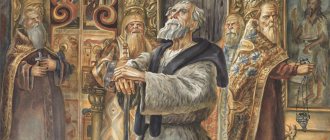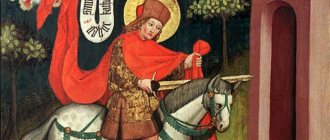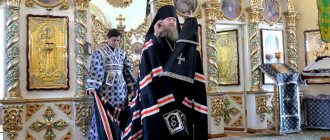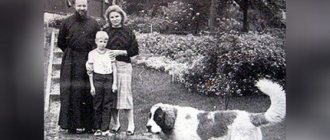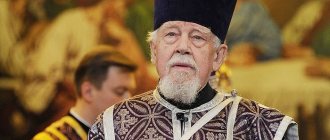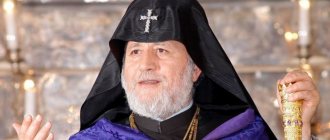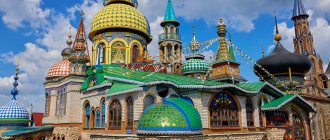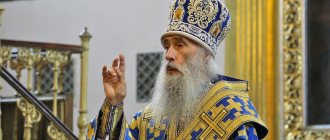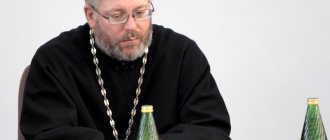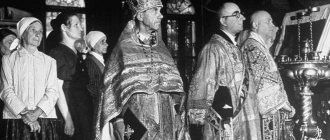Russian Orthodox Church
See also the website Biography of His Holiness Patriarch Kirill of Moscow and All Russia
His Holiness Patriarch of Moscow and All Rus' Kirill (in the world Vladimir Mikhailovich Gundyaev) was born on November 20, 1946 in Leningrad.
Father - Gundyaev Mikhail Vasilyevich, a priest, died in 1974. Mother - Gundyaeva Raisa Vladimirovna, a teacher of German at school, in recent years a housewife, died in 1984. Elder brother - Archpriest Nikolai Gundyaev, professor of the St. Petersburg Theological Academy, honorary rector of the Transfiguration Cathedral in St. Petersburg. Grandfather - Priest Vasily Stepanovich Gundyaev, prisoner of Solovki, for church activities and the fight against renovationism in the 20s, 30s and 40s. XX century subjected to imprisonment and exile.
After graduating from the 8th grade of high school, Vladimir Gundyaev joined the Leningrad Complex Geological Expedition of the North-Western Geological Directorate, where he worked from 1962 to 1965 as a cartographic technician, combining work with studying at high school.
After graduating from high school in 1965, he entered the Leningrad Theological Seminary, and then the Leningrad Theological Academy, from which he graduated with honors in 1970.
On April 3, 1969, Metropolitan Nikodim (Rotov) of Leningrad and Novgorod was tonsured a monk with the name Kirill. On April 7 he was ordained a hierodeacon, and on June 1 of the same year - a hieromonk.
Since 1970 - Candidate of Theology at the Leningrad Theological Academy.
In 1970-1971 - teacher of dogmatic theology and assistant inspector of Leningrad theological schools; at the same time - personal secretary of Metropolitan Nikodim of Leningrad and Novgorod and class teacher of the 1st class of the seminary.
On September 12, 1971 he was elevated to the rank of archimandrite.
In 1971-1974. - Representative of the Moscow Patriarchate at the World Council of Churches in Geneva.
From December 26, 1974 to December 26, 1984 - rector of the Leningrad Theological Academy and Seminary. In 1974-1984. - Associate Professor of the Department of Patrolology of the Leningrad Theological Academy.
On March 14, 1976 he was consecrated Bishop of Vyborg.
On September 2, 1977, he was elevated to the rank of archbishop.
Since December 26, 1984 - Archbishop of Smolensk and Vyazemsky.
Since 1986 - manager of parishes in the Kaliningrad region.
Since 1988 - Archbishop of Smolensk and Kaliningrad.
From November 13, 1989 to 2009 - Chairman of the Department for External Church Relations (since August 2000 - Department for External Church Relations), permanent member of the Holy Synod.
On February 25, 1991 he was elevated to the rank of metropolitan.
Fulfilling the obediences of the Hierarchy, His Eminence Kirill was:
- from 1975 to 1982 - Chairman of the Diocesan Council of the Leningrad Metropolis;
- from 1975 to 1998 - Member of the Central Committee and the Executive Committee of the World Council of Churches;
- from 1976 to 1978 - Deputy Patriarchal Exarch of Western Europe;
- from 1976 to 1984 - Member of the Holy Synod Commission on Christian Unity;
- from 1978 to 1984 - Manager of the Patriarchal parishes in Finland;
- from 1978 to 1984 — Deputy Chairman of the branch of the Department for External Church Relations in Leningrad;
- from 1980 to 1988 — member of the commission for the preparation and holding of the celebration of the 1000th anniversary of the Baptism of Rus';
- in 1990 - member of the commission for the preparation of the Local Council of the Russian Orthodox Church;
- in 1990 - member of the commission to promote efforts to overcome the consequences of the accident at the Chernobyl nuclear power plant;
- from 1989 to 1996 - manager of the Orthodox Hungarian deanery;
- from 1990 to 1991 — temporary administrator of the Hague-Netherlands diocese;
- from 1990 to 1993 - temporary manager of the Korsun diocese;
- from 1990 to 1993 - Chairman of the Holy Synod Commission for the Revival of Religious and Moral Education and Charity;
- from 1990 to 2000 - Chairman of the Holy Synod commission on amending the Charter on the governance of the Russian Orthodox Church. The Charter was adopted at the Jubilee Council of Bishops in 2000;
- from 1994 to 2002 — Member of the Public Council for the Revival of the Cathedral of Christ the Savior in Moscow;
- from 1994 to 1996 — Member of the Foreign Policy Council of the Russian Ministry of Foreign Affairs;
- from 1995 to 2000 - Chairman of the Synodal Working Group for the development of the Concept of the Russian Orthodox Church on issues of church-state relations and problems of modern society as a whole;
- from 1995 to 1999 - Member of the Russian Organizing Committee for the preparation and holding of events in connection with the celebration of memorable dates of the Great Patriotic War of 1941-1945;
- from 1996 to 2000 - Member of the Supervisory Board of the 50th Anniversary of the Victory Foundation.
At the time of his election to the Patriarchal Throne, Metropolitan Kirill appeared:
- permanent member of the Holy Synod (since 1989);
- Chairman of the Department for External Church Relations (since 1989);
- manager of the Patriarchal parishes in Finland (since 1990);
- member of the Synodal Theological Commission (since February 26, 1994);
- member of the Patriarchal and Synodal Biblical Commission (since 1990);
- co-chairman (since 1993) and deputy head (since 1995) of the World Russian People's Council, chairman of the Smolensk (since 1996) and Kaliningrad (since 1997) branches of the VRNS;
- member of the Council of the Zemstvo Movement (since 1993);
- member of the Russian Palestinian Society;
- author and host of the weekly television program “The Word of the Shepherd” on Channel One (since 1994);
- honorary president of the World Conference on Religion and Peace (since 1994);
- member of the Council for Interaction with Religious Associations under the President of the Russian Federation (since 1995);
- member of the Commission under the President of the Russian Federation for State Prizes in the field of literature and art (since 1995);
- honorary member of the Moscow Intellectual and Business Club (since 1995);
- co-chairman of the Christian Interfaith Advisory Committee (since 1996);
- member of the presidium of the Interreligious Council of Russia (since 1998);
- editor-in-chief of the magazines “Church and Time” (since 1991), “Smolensk Diocesan Gazette” (since 1993), “Orthodox Pilgrim” (since 2001);
- member of the church-scientific council for the publication of the Orthodox Encyclopedia (since 1999);
- member of the Supervisory Board of the Cathedral of Christ the Savior in Moscow (since 2002);
- co-chairman of the Council of European Religious Leaders (since 2002);
- Chairman of the organizing committee of the exhibition “Orthodox Rus'” (since 2003);
- co-chairman of the Working Group on interaction of the Russian Orthodox Church with the Ministry of Foreign Affairs of Russia (since 2003);
- Chairman of the Executive Committee of the CIS Interreligious Council (since 2004);
- member of the presidium of the CIS Interreligious Council (since 2004);
- member of the Council for Interaction with Religious Associations under the President of the Russian Federation (since 2004);
- Chairman of the Commission for the Affairs of Old Believer Parishes and for Interaction with the Old Believers (since 2005);
- chairman of the working group to draw up a conceptual document outlining the position of the Russian Orthodox Church in the field of interreligious relations (since 2005);
- Chairman of the working group for the preparation of a document expressing the position of the Russian Orthodox Church on the problems of globalization (since 2005);
- member of the Joint Commission on National Policy and Relations between the State and Religious Associations (since 2006);
- co-chairman of the World Conference of Religions for Peace (since 2006);
- head of the working group for the development of the “Fundamentals of the teaching of the Russian Orthodox Church on dignity, freedom and human rights”;
- Locum Tenens of the Patriarchal Throne (since December 6, 2008).
His Holiness Patriarch Kirill has the following academic degrees and titles:
- since 1970 - candidate of theology at the Leningrad Theological Academy;
- in 1974-1984 — Associate Professor of the Department of Patrolology of the Leningrad Theological Academy;
- in 1983-1989 — teaching in graduate school at the Moscow Theological Academy;
- since 1986 - honorary member of the St. Petersburg Theological Academy;
- since 1987 - honorary doctor of theology from the Theological Academy in Budapest;
- since 1992 - member of the Academy of Creativity;
- since 1994 - honorary member of the International Academy of Eurasia;
- since 1996 - honorary professor of the Military Academy (now University) of Air Defense of the Ground Forces;
- since 1997 - full member of the Academy of Russian Literature;
- since 2002 - full member of the Academy of Social Sciences and Humanities (since 2003 - Public Russian Academy of Social Sciences);
- since 2002 - Honorary Doctor of Political Science from the State University of Perugia (Italy);
- since 2004 - honorary doctor of theology from the Christian Academy of Warsaw (Poland);
- since 2004 - honorary professor of Smolensk Humanitarian University;
- since 2005 - honorary professor at Astrakhan University;
- since 2005 - honorary doctor of the Russian State Social University;
- since 2006 - honorary professor at the Baltic Naval Institute named after Admiral Fyodor Ushakov;
- since 2007 - honorary president of the Academy of Russian Literature;
- since 2007 - honorary doctor of the St. Petersburg State Polytechnic University;
- since 2009 - honorary doctor of theology of the Kyiv Theological Academy;
- since 2009 - honorary doctor of theology from the Institute of Theology. St. Methodius and Kirill Belarusian State University;
- since 2009 - honorary doctor of theology of the St. Petersburg Theological Academy;
- since 2009 - honorary member of the Russian Academy of Education;
- since 2009 - honorary doctor of the Russian Academy of Public Administration under the President of the Russian Federation;
- since 2010 - honorary doctor of the National Research Nuclear University "MEPhI";
- since 2010 - honorary professor at the Military Academy of the Strategic Missile Forces named after Peter the Great;
- since 2010 - honorary doctor of Petrozavodsk State University;
- since 2010 - honorary doctor of Yerevan State University;
- since 2010 - honorary doctor of the Odessa National Law Academy;
- since 2010 - honorary doctor of theology of the Moscow Theological Academy;
- since 2011 - honorary doctor of the Pridnestrovian State University named after. T.G. Shevchenko;
- since 2011 - honorary doctor of Voronezh State University;
- since 2011 - honorary doctor of Moscow State University. M.V. Lomonosov;
- since 2012 - honorary doctor of the Sofia University of Cultural Heritage;
- since 2012 - Honorary Doctor of Theology at St. Tikhon's Orthodox Humanitarian University;
- since 2013 - honorary professor of the Russian Scientific Center for Surgery named after. Academician B.V. Petrovsky RAMS;
- since 2014 - honorary doctor of the University of Belgrade;
- since 2015 - honorary doctor of the Diplomatic Academy of the Ministry of Foreign Affairs of the Russian Federation;
- since 2015 - honorary doctor of theology at the All-Church Postgraduate and Doctoral Studies named after Saints Cyril and Methodius;
- since 2016 - honorary doctor of the Russian Economic University. G.V. Plekhanov;
- since 2016 - honorary doctor of St. Petersburg State University;
- since 2017 - honorary doctor of the Kyrgyz-Russian Slavic University (Kyrgyzstan);
- since 2018 - honorary professor at Kuban State University.
He was invited to give lectures in Rome (1972), at the University of Helsinki, at the Abu Academy in Turku, at the Orthodox Seminary in Kuopio (Finland, 1975), at the Ecumenical Institute in Bosse (Switzerland, 1972, 1973). ), to the University of Münster (Germany, 1988), to the University of Udine (Italy, 1988), to the State University of Perugia (Italy, 2002), to the Christian Academy of Warsaw (Poland, 2004). He has made presentations at many Russian and foreign conferences, symposiums and forums.
His Holiness Patriarch Kirill is the author of the following books:
- The formation and development of the church hierarchy and the teaching of the Orthodox Church about its gracious character. - L.: 1971;
- Challenges of modern civilization. How does the Orthodox Church respond to them? - M.: 2002;
- Word of the Shepherd. God and man. The story of salvation. - M.: 2004;
- L'Evangile et la liberte. Les valeurs de la Tradition dans la société laique. — Paris: 2006;
- Freedom and responsibility: in search of harmony. - M.: 2008;
- Freedom and responsibility: in search of harmony. Human rights and personal dignity. - Updated edition, - M.: 2014;
- “Unknown” Patriarch Kirill. - M.: 2009;
- Patriarch of Unity. Collection of sermons in Ukraine. — Kyiv: 2009;
- Patriarch and youth: conversation without diplomacy. - M.: 2009;
- Holy Rus' - together or apart? Patriarch in Ukraine. - M.: 2009;
- Vanguard of the Church. — Tver: 2009;
- Words. Sermons. Performances. — Kyiv: 2009;
- Be faithful to God. Book of conversations with His Holiness Patriarch Kirill. — Minsk: 2009;
- The strength of a nation lies in the strength of its spirit. — Minsk: 2009;
- The Church calls for unity. — Minsk: 2010;
- Keep faith in your hearts. — Minsk: 2011;
- Noi suntem un singur popor în faţa lui Dumnezeu. — We are one people before God (in Moldovan language). - 2011;
- Sermons 2009-2010. — Holy Trinity Lavra of St. Sergius, 2010;
- Sermons 2010-2011. — Holy Trinity Lavra of St. Sergius, 2012;
- Sermons 2012. - Holy Trinity Sergius Lavra, 2013;
- Sermons 2013. - Holy Trinity Sergius Lavra, 2014;
- Sermons 2014. - Holy Trinity Sergius Lavra, 2015;
- Sermons 2015. - Holy Trinity Sergius Lavra, 2016;
- The mystery of repentance. Lenten sermons (2001-2011). - M.: 2012;
- The mystery of repentance. Lenten sermons (2001-2014). - Updated edition, - M.: 2015;
- Word of the Primate. Collection of works. Series I. T. 1 (2009-2011). - M.: 2012;
- The word of the shepherd. Collection of works. Series II. T. 1 (1991-2011). - M.: 2013;
- Overcoming turmoil. // Series “Word of His Holiness the Patriarch”. - M.: 2013. - Issue. 1;
- The word of the shepherd. Collection of works. Series II. T. 2 (1991-2011). - M.: 2014;
- Holy Land. // Series “Word of His Holiness the Patriarch”. - M.: 2014. - Issue. 2. ...
as well as 3,579 publications, including publications on the official website of the Russian Orthodox Church, in domestic and foreign periodicals (data as of February 1, 2022).
A series of television programs with speeches by His Holiness Patriarch Kirill have been published: “The Word of the Shepherd” - Introduction to Orthodox doctrine; “Word-Sacrament-Church” - History of the early Christian Church and teaching about the Church; “Anniversary Council of Bishops” - Fundamentals of the social concept - Charter of the Russian Orthodox Church - Acts on canonization, “Attitude towards heterodoxy”; “The Word of the Shepherd” - Church, state, politics (part 1), Church, personality, society (part 2), About faith and salvation (part 3), Does Russia have a future (part 4).
Dozens of videos dedicated to the life and work of His Holiness Patriarch Kirill, the election and enthronement of His Holiness, with recordings of services, sermons, meetings and live speeches that took place during visits to Russian dioceses, Ukraine, Belarus, Estonia have been created and released on discs. and Armenia, as well as speeches by His Holiness Patriarch Kirill on Russian television. Series of sermons by His Holiness and recordings of a number of meetings with young people have also been published on audio media.
Interaction with Local Orthodox Churches
His Holiness Patriarch Kirill has worked and is working in the field of inter-Orthodox relations. He was the first representative of the Russian Orthodox Church in Syndesmos - the World Brotherhood of Orthodox youth organizations. From 1971 to 1977 - Member of the Syndesmos Executive Committee; participant of the VIII (Boston, 1971), IX (Geneva, 1977), X (Finland, 1980) and XIV (Moscow, 1992) General Assemblies of this organization; participant of the first Pre-Conciliar Pan-Orthodox Conference (Chambesy, 1976) and the Inter-Orthodox Commission for the preparation of the Holy and Great Council of the Eastern Orthodox Church (Chambesy, 1993, 1999); main speaker at the Orthodox consultation “Common Understanding and Vision of the WCC” (Chambesy, 1995); participant in the Pan-Orthodox Consultation on Ecumenism (Thessaloniki, 1998) and the Meeting of the Heads of Local Orthodox Churches on healing the Bulgarian church schism (Sofia, 1998); participant of the Pan-Orthodox celebration of 2000 years of Christianity in Bethlehem on January 7, 2000; participant in negotiations between the Moscow and Constantinople Patriarchates (Istanbul, 1977, Geneva, 1978, Istanbul 1990, Moscow, 1991, Istanbul, 1993) and regular consultations on current problems between the two Churches; conducted negotiations with the Orthodox Church of Constantinople on Estonia and with the Romanian Orthodox Church on the problem of the Bessarabian Metropolis in Moldova (twice in 1997 in Geneva, Chisinau, 1999).
In 2005, as the head of the delegation of the Russian Orthodox Church, he took part in the enthronement of Patriarch Theophilus III of Jerusalem.
As chairman of the DECR, as part of official delegations, he visited all Local Orthodox Churches, including accompanying His Holiness Patriarch Pimen and His Holiness Patriarch Alexy II on their trips abroad.
Inter-Christian relations and cooperation
His Holiness Patriarch Kirill took part in the work of inter-Christian organizations. As a delegate, he participated in the IV (Uppsala, Sweden, 1968), V (Nairobi, Kenya, 1975), VI (Vancouver, Canada, 1983) and VII (Canberra, Australia, 1991) General Assemblies of the WCC and as a guest of honor at the IX General Assembly of the WCC (Porto Alegre, Brazil, 2006); at the World Missionary Conference "Salvation Today" (Bangkok, 1973); was president of the World Conference on Faith, Science and the Future (Boston, 1979) and the World Convocation on Peace, Justice and Integrity of Creation (Seoul, 1990); participated in the assemblies of the Commission “Faith and Order” of the WCC in Accra (Ghana, 1974), in Lima (Peru, 1982), in Budapest (Hungary, 1989). Was the keynote speaker at the World Missionary Conference in San Salvador, Brazil, November 1996.
He was a delegate to the XI General Assembly of the Conference of European Churches (Stirling, Scotland, 1986) and the XII General Assembly of the CEC (Prague, 1992), as well as one of the main speakers at the European Assembly of the CEC “Peace and Justice” (Basel, 6- May 21, 1989).
He was a participant in the Second European Assembly of the CEC in Graz, Austria (23-29 June 1997) and the Third in Sibiu, Romania (5-9 September 2007).
He took part in four rounds of bilateral interviews between theologians of the Russian Orthodox and Roman Catholic Churches (Leningrad, 1967, Bari, Italy, 1969, Zagorsk, 1972, Trento, Italy, 1975).
Since 1977 - Secretary of the International Technical Commission for the Preparation of Dialogue between the Orthodox and Roman Catholic Churches. Since 1980 - member of the International Theological Commission for Orthodox-Catholic Dialogue. In this capacity, he took part in four plenary meetings of this commission: (Patmos-Rhodes, Greece, 1980; Munich, Germany, 1982; Crete, 1984; Valaam, Finland, 1988) and in the work of its Coordination Committee committee.
He was a co-chairman of the second round of the Orthodox-Reformed dialogue (Debrecen II) in 1976 in Leningrad and a participant in the Evangelical Kirchentags in Wittenberg (GDR, 1983) in Dortmund (1991) in Hamburg (1995).
Participant in dialogue with the delegation of the Old Catholic Church in connection with the 100th anniversary of the Rotterdam-Petersburg Commission, Moscow, 1996.
As Chairman of the DECR, on behalf of the Hierarchy of the Russian Orthodox Church, he took part in contacts with the Churches of the USA, Japan, East Germany, Germany, Finland, Italy, Switzerland, Great Britain, Belgium, Holland, France, Spain, Norway, Iceland, Poland, the Czech Republic, Slovakia, Ethiopia, Australia, New Zealand, India, Thailand, Sri Lanka, Laos, Jamaica, Canada, Congo, Zaire, Argentina, Chile, Cyprus, China, South Africa, Greece.
Participation in Councils of the Russian Orthodox Church
He was a member of the Local Jubilee Council of the Russian Orthodox Church (June 1988, Zagorsk), chairman of its Editorial Commission and the author of the draft Charter of the Russian Orthodox Church, adopted by the Jubilee Council.
He was a participant in the Council of Bishops dedicated to the 400th anniversary of the restoration of the Patriarchate (October 1989) and the extraordinary Council of Bishops on January 30-31, 1990, as well as the Local Council on June 6-10, 1990, and the Council of Bishops on October 25-26, 1991. ; March 31 - April 4, 1992; June 11, 1992; November 29 - December 2, 1994; February 18-23, 1997; August 13-16, 2000; October 3-6, 2004, June 24-29, 2008
He presided over the Bishops' Councils (2009, 2011, 2013, 2016, 2022) and Local Councils (2009), and at the other indicated Councils of the Russian Orthodox Church he was the chairman of the Editorial Commission.
As chairman of the DECR, he made reports on the work of the DECR. At the Jubilee Council in 2000, as chairman of the relevant Synodal Working Group and Synodal Commission, he presented the Fundamentals of the Social Concept of the Russian Orthodox Church and the Charter of the Russian Orthodox Church.
At the Council of Bishops on October 3-6, 2004, he also made a report “On the relationship with the Russian Church Abroad and the Old Believers.”
Management of the Smolensk-Kaliningrad diocese (1984-2009)
During the stay of His Holiness Patriarch Kirill at the Smolensk-Kaliningrad See, 166 parishes were opened (94 in Smolensk and the region, 72 in Kaliningrad and the region). 52 Orthodox churches were restored and 71 were rebuilt.
In 1989, the Smolensk Theological School was opened, which was transformed in 1995 into the Smolensk Theological Seminary.
Since 1998, the Interdiocesan Theological School has been operating, training church choir directors, catechists, icon painters and sisters of mercy. Most parishes in the diocese operate Sunday schools. There are Orthodox gymnasiums and kindergartens.
Since 1992, the Fundamentals of Orthodox Culture have been taught in public schools in the Smolensk and Kaliningrad regions.
Serving as DECR Chairman (1989-2009)
Represented the Russian Orthodox Church in the commissions for the development of the USSR Law “On Freedom of Conscience and Religious Organizations” dated October 1, 1990, the RSFSR Law “On Freedom of Religion” dated October 25, 1990, and the Federal Law of the Russian Federation “On Freedom of Conscience and Religious Organizations”. associations" dated September 26, 1997.
As chairman of the DECR, he took part in many international public and peacekeeping initiatives.
He took part in developing the church position and peacekeeping actions during the events of August 1991 and October 1993.
He was one of the initiators of the creation of the World Russian People's Council in 1993. He took part and delivered keynote speeches at the Councils (1993-2008). Since his election to the Patriarchal Throne, he has been the Chairman of the VRNS (since 2009).
As chairman of the Holy Synod's Commission for the Revival of Religious and Moral Education and Charity, he initiated the creation of synodal departments for religious education, social service and charity, and interaction with the armed forces and law enforcement agencies. He was the author of the Concept for the revival of charity and religious education, adopted by the Holy Synod on January 30, 1991.
Developed and submitted for approval to the Holy Synod the “Concept of interaction of the Russian Orthodox Church with the armed forces” in 1994.
From 1996 to 2000 — led the development and presented to the Anniversary Council of Bishops in 2000 “Fundamentals of the social concept of the Russian Orthodox Church.”
He took an active part in normalizing the church situation in Estonia. In this regard, he visited the Patriarchates of Antioch and Jerusalem (trips to Lebanon, Syria, Jordan and Israel in 1996), and also participated in negotiations with representatives of the Patriarchate of Constantinople in Zurich (Switzerland) in March and twice in April 1996. , in Thessaloniki, Tallinn and Athens (1996), in Odessa (1997), in Geneva (1998), in Moscow, Geneva and Zurich (2000), in Vienna, Berlin and Zurich (2001 .), in Moscow and Istanbul (2003); He also visited Estonia several times, where he negotiated with government representatives, members of parliament and the business community of this country.
He took an active part in peacekeeping actions in Yugoslavia. Repeatedly during the war he visited Belgrade, negotiated with the leadership of this country, initiated the creation of an informal international Christian peacekeeping group on Yugoslavia (Vienna, May 1999) and the convening of an international inter-Christian conference on the topic: “Europe after the Kosovo crisis: further actions of the Churches” in Oslo (Norway) in November 1999.
He was the main speaker at the Parliamentary hearings on the “Fundamentals of the social concept of the Russian Orthodox Church” (Moscow, 2001), and the topics “Religion and Health” (Moscow, 2003), “Improving legislation on freedom of conscience and on religious organizations: practice of application, problems and solutions" (Moscow, 2004).
He initiated a dialogue with European organizations in Brussels and the creation in 2002 of the Representative Office of the Russian Orthodox Church at European international organizations.
As DECR Chairman, he visited Estonia (multiple), Switzerland (multiple), France (multiple), Spain (multiple), Italy (multiple), Belgium (multiple), Holland (multiple), Germany (multiple), Israel (multiple), Finland (multiple), Ukraine (multiple), Japan (multiple), Canada (multiple), China (multiple), Hungary (multiple), Moldova (multiple), Norway (multiple), Lebanon and Syria (multiple), Serbia (multiple) ), USA (multiple), Turkey (multiple), Brazil (multiple), Australia (1991), Austria (multiple), Latvia (1992), Chile (1992), Bulgaria (1994, 1998, 2005 gg.), Czech Republic (1996, 2004, 2007), Slovakia (1996), Iran (1996), Lithuania (1997), Denmark (1997), Morocco (1997), Argentina (1997, 2006), Mexico (1998), Panama (1998), Peru (1998), Cuba (1998, 2004, 2008), Luxembourg (1999), Nepal ( 2000), Slovenia (2001), Malta (2001), Tunisia (2001), Mongolia (2001), Croatia (2001), Vietnam (2001), Kampuchea (2001) ), Thailand (2001), Ireland (2001), Iraq (2002), Liechtenstein (2002), Philippines (2002), special areas of the PRC - Hong Kong (2001, 2002). ), Macau (2002), South Africa (2003, 2008), Malaysia (2003), Indonesia (2003), Singapore (2003), UAE (2004), Poland (2004 .), the Netherlands (2004), the Dominican Republic (2004), Yemen (2005), North Korea (2006), India (2006), Romania (2007), Turkmenistan (2008). ), Costa Rica (2008), Venezuela (2008), Colombia (2008), Ecuador (2008), Angola (2008), Namibia (2008). He made official visits to Hungary, Mongolia, Slovenia, Iran, Iraq and Yemen at the invitation of the governments of these countries.
On January 27, 2009, the Local Council of the Russian Orthodox Church elected Metropolitan Kirill Patriarch of Moscow and All Rus'.
On February 1, 2009, the enthronement of His Holiness Patriarch Kirill took place.
See also the website Biography of His Holiness Patriarch Kirill of Moscow and All Russia
Meeting of Patriarch Kirill and the Pope: The expert calculated the risks for the Russian Church
Russian Ambassador to the Vatican Alexander Avdeev suggested that a meeting between Patriarch Kirill of Moscow and All Rus' and Pope Francis could take place this summer. The head of the ideological department of the Tsargrad TV channel, Mikhail Tyurenkov, expressed a clear demand for the pontiff and calculated the potential risks for the Russian Church from this meeting.
“The second meeting of Pope Francis and Patriarch Kirill is now being prepared,” Russian Ambassador to the Vatican Alexander Avdeev said at a seminar in Genoa, suggesting that it could take place as early as June or July of this year.
The diplomat also noted that the place for the new meeting of the Patriarch of Moscow and All Rus' Kirill and Pope Francis has not yet been chosen, but suggested that this would be the territory where, first of all, Christians suffer.
The head of the ideological department of the Tsargrad TV channel, Mikhail Tyurenkov, commenting on the ambassador’s words, noted that statements about the possibility of another meeting between His Holiness Patriarch Kirill of Moscow and All Rus' and Pope Francis have been heard more than once, including from church speakers, including the head of the Department of External Church connections of the Moscow Patriarchate of Metropolitan Hilarion of Volokolamsk.
“On the one hand, there is nothing extraordinary in such working meetings. In the end, leaders of traditional religions meet regularly, the main thing is that this communication does not affect the foundations of faith and does not lead to compromises that are contrary to Orthodoxy. And here, any doubts are a strange distrust of the Primate of our Church,” the expert noted. “On the other hand, the Roman Pontiff is not the Buddhist Dalai Lama, and the history of our complex relationship with the Roman Catholic Church is not complete. Thus, the same Ukrainian Greek Catholics (Uniates) are still the vanguard of Russophobic propaganda in Ukraine, and also take an active part in punitive operations against the Russian people of Donbass.”
That is why, Mikhail Tyurenkov is sure, from such meetings I would very much like to expect non-declarativeness at the level of common positions on social and moral issues (especially since Pope Francis has already made a serious compromise with the left-liberal ideology of the modern world).
“I would like to hear from the Pope a clear condemnation of the Russophobic and anti-Orthodox actions of the Ukrainian Greek Catholic Church subordinate to him. Otherwise, such a meeting could bring reputational risks to the hierarchy of the Russian Orthodox Church,” the expert sums up.
Job Patriarch
Job (in the world Ivan) was the first Moscow patriarch. He came from a townsman family in the city of Staritsa. From an early age he had an interest in reading, so he was sent to study at the local Assumption Monastery. Under the influence of Archimandrite Herman, he took monastic vows in 1556. In 1569, after Ivan the Terrible visited the monastery, he was appointed its archimandrite.
In 1571, by order of Ivan the Terrible, Job was transferred to Moscow and first became the archimandrite of the Simonov Monastery, then of Novospassky. In 1581 he became Bishop of Kolomna, in 1586 - Archbishop of Rostov. After the disgrace imposed on Metropolitan Dionysius, at the end of 1586 Job was elevated to the rank of Metropolitan of Moscow.
In January 1589, when the issue of establishing the Moscow Patriarchate was resolved, Job was proclaimed the first Patriarch of Moscow. Contemporaries explained the kings' special love for Job by the fact that he was highly educated, had a good memory and a beautiful voice. During his service, those present could not help but cry, he spoke and sang so soulfully.
Job supported Tsar Fedor and his wife in everything. Therefore, he provided great assistance to their protege B.F. Godunov in his election to the throne. After the death of Tsar Fyodor and the departure of Tsarina Irina to the monastery, it was Job who headed the provisional government. Then he organized the convening of the Zemsky Sobor for the election of the Tsar and at its meeting he read out his essay “The Tale of the Honest Life of Tsar Fyodor Ivanovich.” It did not glorify the deceased sovereign so much as it proved that the main participant in all royal affairs and undertakings was B.F. Godunov. According to the patriarch, only he was worthy of the royal throne.
Since there were no other candidates for the throne, on February 17, 1598, the participants of the council elected Boris Godunov as the new Tsar. Then Job organized popular processions to the Novodevichy Convent, where Boris and his sister were, to beg the people's chosen one to accept the royal title. Since Godunov constantly refused, Job declared February 21 a new holiday in honor of the Mother of God Hodegetria and, at the head of the boyars, court servants and a large crowd of people, he himself went to the monastery. There, during the ritual of “begging with an icon,” B.F. Godunov agreed to become king.
After the accession of Tsar Boris to the throne, Patriarch Job became his reliable support. He did not condemn the king’s decision to marry his daughter to one of the foreign princes - the Swedish Gustav or the Danish Johann, although they were of a different faith. He exposed the self-proclaimed Tsarevich Dmitry. On his instructions, representatives of the clergy found out the real name of the adventurer; he turned out to be the fugitive monk Grishka Otrepiev, who lived in the Kremlin Chudov Monastery and served as Job’s cell attendant.
After the death of Tsar Boris in April 1605, Job supported his son Tsarevich Fyodor as the betrothed Tsar and began preparations for his crowning. But due to the treason of the tsar’s army near Kromy in May of the same year, he did not have time to carry out this ceremony. In June, the Godunovs were overthrown, and Job, by order of False Dmitry, was sent to the Staritsky Assumption Monastery. There he went blind after some time.
In 1607, at the request of the new Tsar Vasily Shuisky and Patriarch Hermogenes, Job came to Moscow and took part in the repentance ceremony of Muscovites. With tears in their eyes, they asked the former shepherd for forgiveness for their expulsion. He forgave everyone. After returning to Staritsa, Job soon died. About 20 of his messages to various people have survived, as well as a number of other writings.
Author: L.E. Morozova, Doctor of Historical Sciences
